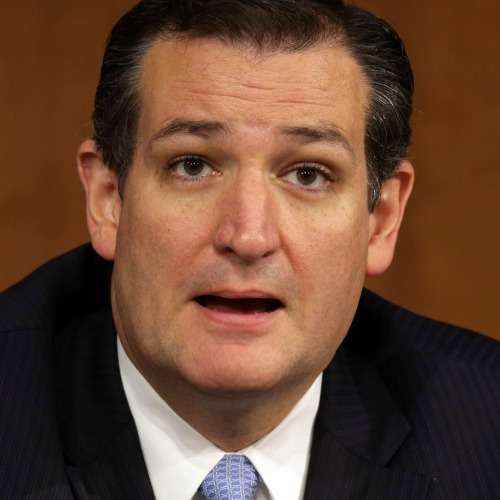IDC Leader: Ted Cruz Put ‘Lives at Risk’ at In Defense of Christians Summit
The Texas senator potentially gave extremists more reason to exterminate Middle East Christians by calling Israel their greatest ally, said In Defense of Christians’ executive director.

WASHINGTON — Leaders of the In Defense of Christians summit, an event that raised awareness about the ongoing genocide of Christians from the Middle East, fear U.S. Sen. Ted Cruz of Texas may have put “lives at risk” with his controversial keynote address at last Wednesday’s gala.
“He came to a summit in defense of Christians and actually endangered Christian lives,” said Andrew Doran, executive director of IDC.
Initially, Cruz’s address was warmly received by the more than 900 attendees of the IDC gala dinner at the Omni Shoreham hotel in Washington on Sept. 10. The crowd applauded with equal force when the Texas Republican said, “Tonight, we are all united in defense of Jews” as when he said, “Tonight, we are all united in defense of Christians.”
However, a minority in the room erupted in vocal disagreement and boos when Cruz, after likening the Christian persecution to the situation of Jews in 1948 at the creation of the modern state of Israel, announced, “Today, Christians have no greater ally than the Jewish state.”
Three minutes later, Cruz then left the podium as a result of the heckling — even as a majority of participants instead clapped in response to some of his subsequent remarks — saying as he departed, “If you will not stand with Israel and the Jews, then I will not stand with you.”
Doran said that IDC regretted that some people were not more respectful of Cruz, and he acknowledged that three anti-Israel protesters were removed and banned. But he had “no doubt” that some people understandably were fearful of the optics of the event back in their home countries. He added that the Christian diaspora had much more freedom than Middle-Eastern Christians to voice their support for the state of Israel.
“And if they do, it gives any Islamist group a pretext to eradicate them,” he said.
The Context for Concern
In Gaza, where less than 1% of Gaza’s 1.8 million inhabitants are Christian, Hamas justified the recent summary execution of 27 Palestinians — including two women — on charges they were Israeli collaborators during Operation Protective Edge, an Israeli offensive launched in early July. The Islamist terror group’s executions reportedly were met without protest.
Throughout Syria’s brutal civil war, both President Bashar Assad’s government and the rebels (including the Free Syrian Army) have traded accusations that the other is Israel’s “greatest ally.” Christians constitute 10% of the population, and their bishops have advocated neutrality in the conflict.
Lebanon, which experienced decades of multireligious civil war, still considers itself at war with Israel after a 2006 cease-fire. The country is officially divided 40% Christian, 27% Sunni and 27% Muslim, but Hezbollah’s militia outnumbers the Lebanese Army, and the recent influx of Syrian refugees has made Lebanon’s political unity even more extremely fragile.
Doran said that IDC worked hard to prevent Middle East politics from entering the discussion as some of their Christian attendees have to return to the Middle East. This included preventing the Syrian patriarchs from getting photographed sitting at a congressional hearing that condemned President Assad.
“People had come here trusting us not to put their lives in danger. People had come here for the sake of unity, and for politicians to take advantage of this for their own agenda is absolutely disgraceful,” he said.
Bishop Angaelos, general bishop of the Coptic Orthodox Church in the United Kingdom and Pope Tawardros II’s personal representative at IDC, said in a statement that he observed “complete clarity that advocacy must be for all who suffer persecution, Christian or otherwise,” and said he took “personal exception” with Cruz’s “sweeping statements made about those in attendance as exercising ‘bigotry and hatred … against Jews and Israel.’”
“In light of the current, very real challenges, this is not a time for such divisive and inflammatory language that demonizes communities and causes rifts between them, when their collaboration is most needed,” he said.
The Register tried to contact Cruz’s communications director Amanda Carpenter for comment, but received no response by publication time.
Worries About the Future
For members of the Christian diaspora, a great worry was that Cruz’s speech, and the protest it triggered, might undermine years of hard work to get Washington to recognize and act on the plight of Christians in the Middle East, who faced ethnic cleansing from extremists even during the U.S. occupation of Iraq.
“We have felt for a long time that the world has not been paying attention to us … and as that is going on, ISIS has been drinking our blood in Syria and Iraq,” said Juliana Taimoorazy, president of the Iraqi Christian Relief Council.
Taimoorazy said that while she “personally respects” Cruz and was “deeply upset” that a minority reacted as they did to his comments, she hoped the Texas senator would move on and work positively with Middle East Christians to focus on the genocide faced by Christians and all religious groups at the hands of extremists.
“What’s most upsetting is that this is a time of solidarity for the Jews, the Christians and the moderate Muslims,” she said.
Doran told the Register that IDC is pressing ahead with its work to defend Christians, as “lives continue to be at risk.” Its next phase before the second summit involves establishing regional IDC offices throughout the country.
“There are plans to move ahead in a big way,” he said.
“There’s a better understanding of what needs to happen in terms of organization and unity, and that is the real takeaway from the summit.”
Peter Jesserer Smith is the Register’s Washington correspondent.












